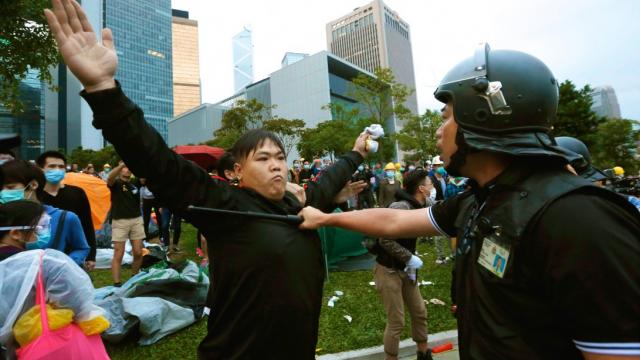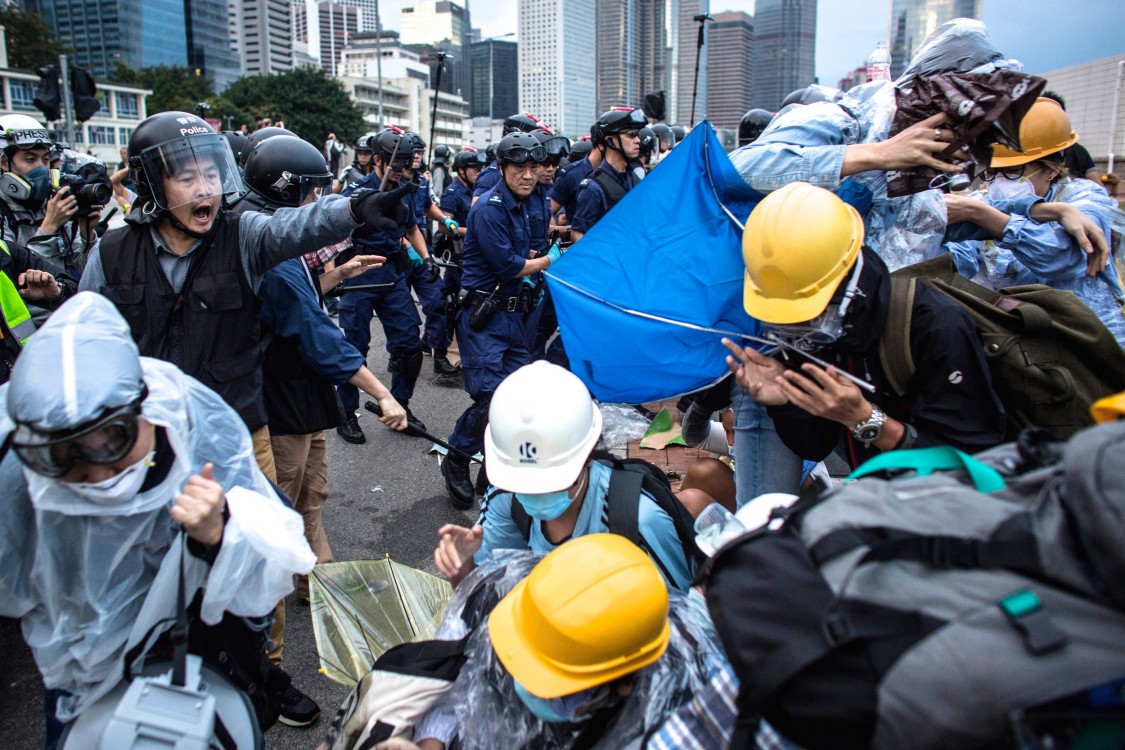
Hong Kong police reclaimed swaths of an area occupied by pro-democracy protesters on Monday morning after hours of intense clashes which led to scores of injuries and arrests.
The clashes were perhaps the most violent since the movement began two months ago. Police baton charges left some protesters prostrate and bleeding, while volleys of pepper spray left others vomiting and temporarily blind. At least 40 people were arrested and 40 taken to hospital; one officer was knocked out cold in a scuffle and taken away on a stretcher.
The police action began at about 8 a.m. local time (midnight GMT) when officers took a flyover above the protest encampment, removed a line of hanging pro-democracy banners, and cheered loudly to celebrate their advance. Protesters below hurled insults and held up their middle fingers.
An hour and a half later, the scene had calmed somewhat, although about 500 protesters remained at the site, some hurling insults at lines of police in full riot gear.
Vinki Tsang, a 20-year-old psychology student, spent the morning picking up debris from a part of flyover still accessible to protesters.
“We do not know what we can do but we just want to try and clean up a little,” said Tsang, both of her knees bandaged from Sunday night’s street battle. “Last night I was very scared. Now I am looking for ways to contribute again to our fight for democracy. I do not understand why the police are so brutal with us — they are Hong Kongers too, they will benefit from the results of our battle as well.”
A 24-year-old office worker who only gave her English name, Sony, said: “The police have lost all self-control. I feel dejected because it is obvious that our methods are not working with them. But since we are not ready to take up arms, we have to think about what we can do to make the situation advance.”
The Hong Kong chief executive, Leung Chun-ying, on Monday said police would now take “resolute action”, adding: “Some people have mistaken the police’s tolerance for weakness.” He urged students not to return to occupation sites, but did not respond when asked by reporters whether police would clear the sites on Monday night.
The events began late on Sunday night when student leaders urged a large crowd of supporters to escalate the pro-democracy movement by surrounding government headquarters. Unable to reach them due to barricades and a heavy police presence, protesters broke through cordons into Tamar Park, a grassy space adjacent to government headquarters, and Lung Wo Road, closing the four-lane east-west route.
Demonstrators on the frontline wore helmets, masks and goggles, carrying plastic shields and the umbrellas that gave the pro-democracy movement its name.
“The police have been beating us so many times,” Kenci Wong, 24, who works in advertising. “But what we are asking for is right. The government hopes we will get tired but we are very determined.”
By morning, police had forcibly cleared both Tamar Park and Lung Wo Road. To pre-empt further advances, protesters barricaded escalators leading to government headquarters and the Lennon Wall, a concrete staircase plastered with messages of support for the movement.
“The action was aimed at paralyzing the government’s operation,” said Alex Chow, secretary general of the Hong Kong Federation of Students, according to Associated Press. “The government has been stalling ... and we believe we need to focus pressure on the government headquarters, the symbol of the government’s power.”
The pepper solution sprayed by police in recent days appears to be stronger than standard pepper spray or even teargas, with a photographer saying he was temporarily blinded by it. Injured protesters with red rashes were washed down with bottled water. One of those giving first aid, a 23-year-old nurse who gave his name as Vincent L, said the spray was six times stronger than teargas.
Police have said the solution is “relatively mild” but have not said exactly what it contains.
“Pain is temporary. We are fighting for a permanent democracy,” said Cheuk Pin, 22, a TV programming assistant who had been hurt by the spray.
Protesters have called for Leung’s resignation as well as open nominations for the election of his successor. The movement was sparked by Beijing’s decision to impose tight controls on nominations in 2017, but authorities say offering universal suffrage is in itself a step forward.
Neither side has shown any sign of compromise. The resurgence of the movement, which has now entered its third month, followed the authorities’ clearance of some protest areas.
Police senior superintendent Tsui Wai-hung blamed the clashes on the protesters. “The police strongly condemn the illegal assembly of participants for repeatedly ignoring police appeals, for their near-mobster behaviour and for their illegal occupation of roads,” he said at a press conference.
The Hong Kong Federation of Students called for the escalation in response to police use of violence in removing people and barricades from a protest zone at Mong Kok earlier this week. More than 100 protesters were arrested, including high-profile student leaders Joshua Wong and Lester Shum. Police said they used the minimum level of force necessary.
Many protesters have remained in the district and there were small-scale clashes on Sunday, with a police spokesman saying it remained a “high-risk” area.
Some protesters briefly occupied Lung Wo Road in the early days of the movement but many others tried to stop them, concerned that it would alienate public support.
It was occupied again in October, but police used teargas to clear demonstrators and arrested 45 people.
Eighteen-year-old Suki Lau said: “Before, we thought that occupying the tunnel was too radical, but the government has led us here until now we have to escalate our action. I am a little bit scared, though.”
Eric Wong, 17, added: “I got pepper-sprayed last Friday and I know how much it hurts. But I am here to defend my future and the future of Hong Kong. I have been boycotting classes since 28 September because this is all we can do to obtain universal suffrage.”
Kong Man-keung, of the police public relations branch, condemned student organizations for inciting illegal actions and said there were also people using the internet to encourage others to plan violent charges of police lines.
“This sort of incitement would lead more radicals and troublemaking individuals or organizations to take part, making the situation even more chaotic … Untoward incidents can be sparked off any time,” he told a press conference.
He added: “Police urge the illegal road-occupiers not to do any provocative acts, obstruct or charge police officers and maintain a safe distance from our officers. Protesters, particularly students, should stay away from the radicals and troublemakers. Police do not want to see anyone, particularly students, getting hurt.”
Lee Cheuk-yan, a pan-democrat legislator, said: “People are very angry that the government keeps refusing to respond and only use police violence instead of finding a political solution. They should stop challenging the students and other demonstrators by betting on how long they can stand to protest in the street. They must listen to the people.”
3 WAYS TO SHOW YOUR SUPPORT
- Log in to post comments












